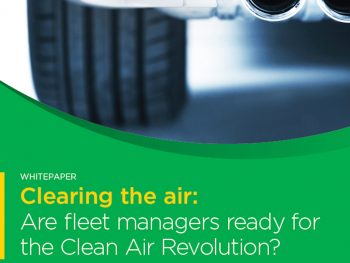One in five fleet managers are unaware of the rules for the different Clean Air Zones in the UK, despite the imminent arrival of more CAZ schemes across the country.

Research commissioned by Europcar Mobility Group UK for its new ‘Clearing the Air’ white paper on CAZs found fleet managers will face new challenges when it comes to building a flexible fleet that not only meets business demands but also the rules of the CAZ schemes, including London’s Ultra Low Emission Zone (ULEZ).
The survey of 300 fleet managers saw 87% say their business will be impacted by the growing number of Clean Air Zones across the UK. A total of 89% stated that a quarter or more of their fleet need to enter a Clean Air Zone more than once a week. But around 30% of businesses had not calculated the potential cost for their fleet.
With charges of £8 per day for cars, taxis and LGVs for Birmingham’s Clean Air Zone and £12.50 for London’s Ultra Low Emission Zone, a business which has just 25 vehicles a week entering a Clean Air Zone could face up to £16,250 in charges.
Ron Santiago, managing director, Europcar Mobility Group UK, said: “Clean Air Zones are a welcome move in the fight for improved air quality in our towns and cities but the white paper findings highlight how important it is that fleet and business travel managers understand the rules and regulations for each of the Clean Air Zones, if they are not to fall foul of potentially heavy fines and daily admission charges for non-compliant vehicles. A lack of awareness could impact the bottom line for many companies and a lack of planning will reduce their ability to remain flexible to changes in business demand.”
For one in five businesses the main concern around switching to a lower-emission fleet is cost but many are looking to alternative options to avoid CAZ charges; Europcar’s white paper reveals that 64% of businesses plan on extending their use of public transport and/or shared mobility solutions for their employees.
A total of 40% said that they intend to use long-term/flexible rental as a way of increasing the number of ‘Clean Air Zone friendly’ vehicles in their fleets. And 48% of businesses plan to decrease the use of ‘grey fleet’ vehicles to ensure they do not face additional costs.
“We believe that long-term rental, along with shared mobility solutions and a greater use of public transport will be a valuable part of sustainable transport strategies going forward. For fleet managers, having the ability to manage costs and ‘flex’ their fleet in response to fluctuations in demand is key to helping their companies thrive,” added Santiago.
To download Europcar’s ‘Clearing the Air’ white paper, click here.

